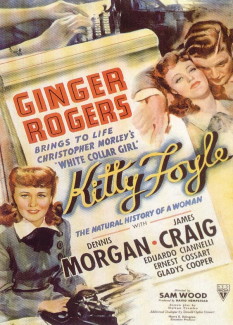
KITTY FOYLE
US, 1940, 106 minutes, Black and white.
Ginger Rogers, Dennis Morgan, James Craig, Eduardo Cianelli, Gladys Cooper.
Directed by Sam Wood.
Kitty Foyle now seems an old fashioned American romantic soap opera, although in its time it presented itself as
modern. It is a pleasant treatment of the new American working girl, the white collar girl, as it says in its preface. The film was directed by Sam Wood, director of a number of fine Hollywood films from some of the Marx Brothers classics like A Night At The Opera through Goodbye Mr Chips to For Whom The Bell Tolls. The screenplay was by Dalton Trumbo (with Donald Ogden Stiers) who was to be black-listed in the late fifties and then returned to screen-writing in his own name in 1960 with Spartacus and Exodus and continued throughout the sixties and seventies.
The film is of interest because Ginger Rogers won the Oscar for her performance. She was at the peak of her dramatic career in the forties. Dennis Morgan is a rather bland hero, James Craig also although he has more sincere charm. There is a good supporting performance by Eduardo Cianelli. The film is of interest in showing something of Hollywood attitudes towards women.
1. How interesting and entertaining a film, its appeal in its time for the portrayal of the working girl, interest now?
2. A film of the early forties, its look, tone, style of American life?
3. The quality of Ginger Rogers' performance? The impact of her personality, an American heroine? Did she merit the award she won?
4. The American soap opera tradition? Romance, the portrait of American men and women, romantic situations, decisions - written at the popular level for emotional response?
5. The importance of the prologue. its humorous tone, the visual history of the emergence of women? Impact in its time? In retrospect?
6. Ginger Rogers' style as Kitty? As representing the ordinary American working girl type? Appearance,
personality, cracks, background, work? Seeing her in the shop, dating? The American feminine audience identifying with the white collar girl? Can this kind of identification happen now?
7. The dramatic presentation of her dilemma? The portrayal of two proposals on the one evening? Her decisions? The audience not knowing the background and making a choice for her and then seeing her analysing the alternatives? The device of having the two Kitties, one in the mirror talking more sense than the actual Kitty? The dramatic device and the way that Ginger Rogers carried it off? The device of the globe and the bowl with the snow as indicating the passing of time in the flashbacks? The symbol of the witch and the evocation of Strega? How did the screenplay help the audience to assess the real alternatives for Kitty, the varying emotions and response to both Win and Mark? - did the screenplay stack the decision in favour of Mark by showing him first. having Kitty go out with him and help in the delivery of the birth of the baby, her remarks about the baby (and the irony that she had already had a child?) The irony that the audience did not know that she had already been married to Win?
8. The cumulative effect of the flashbacks in helping to understand Kitty's character? At home, seeing her as a young girl. looking out at the parade for the wealthy of Philadelphia, her attitudes towards the straight-line rich? Her bonds with her father? The social background and the class to which she belonged?
9. The initial impact of Win - at home, work on the magazine, her going to work for him, falling in love with him, her ironic reactions to him especially about the Dictaphone and replaying it? Her zest for her work and her attitudes towards the clients, towards her fellow reporters, the emphasis of the class differences in her work?
10. How convincing was the build-up of the romance with Win? The visit to New York and the long sequence in Giono's restaurant, background of prohibition, the symbolism of the Strega bottle, the background, the background of Roosevelt and his election and Giono's reaction? Going away to the snow? Their sharing, talking?
11. The techniques of showing the growing relationship between the two - especially in the tender close-ups and the discussion? The effect of Kitty on Kitty and her love for Win? His self pre-occupation?
12. Dennis Morgan's style as Win? Portraying the Philadelphia high society man? His strengths and weaknesses? A weak type, dominated? His romantic attitudes towards Kitty in New York, at the snow, in discussion? Why could he not bring himself to marry her at once?
13. The build-up to the marriage, the proposal,. the effect on each of them? The return to Philadelphia, the train? The discussion at home, the reaction of his family and their discussion about class, breeding, finishing schools etc? Kitty speaking her mind? The inevitability of the divorce? The effect on Kitty?
14. Win's call, her rushing to Giono's, the way that she found out about his next wedding?
15. Her return to Philadelphia, the background of the assembly and her not going, Win not taking his wife? Audience response to Win's wife, to his little boy and the emotional effect on Kitty? The importance of the background of her own pregnancy. her inability to tell Win, the loss of her baby? (And the help of Delphine during that time?) Her decision to send the ring back and return to New York?
16. The contrast with Mark - the introduction to him, her fainting, the card night and his testing her, his theories, their outings, his being stood up while she married? The Strega sequence at Giono's?
17. Comment on the observation of detail of life in those times, Philadelphia, New York, homes, work, shops?
18. A blend of humour and sentiment in the American style?